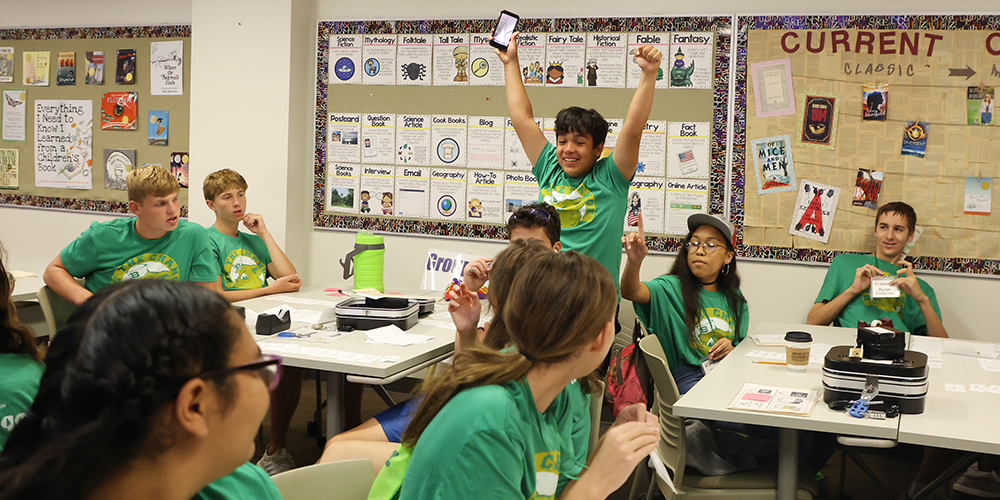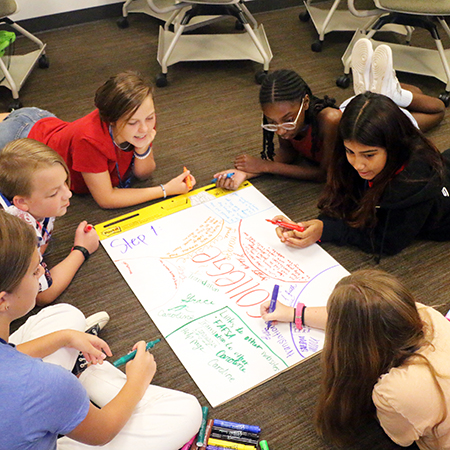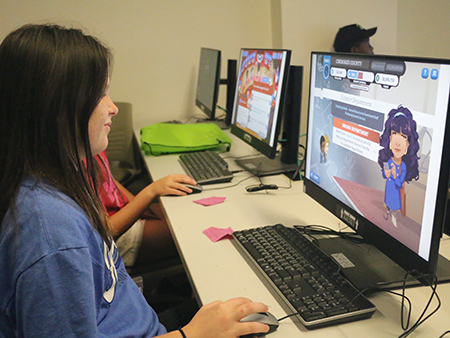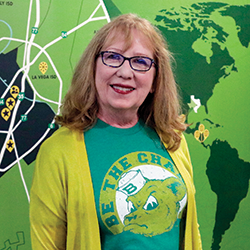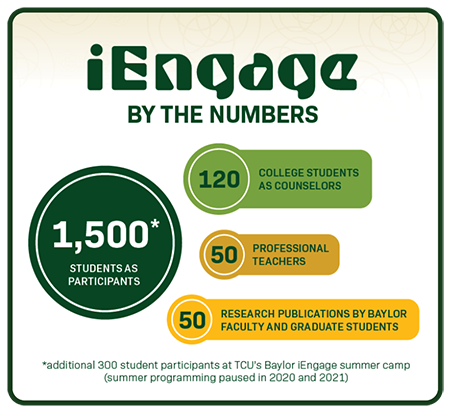COVER STORY: Finding Their Voice
Baylor iEngage Aims to Help Students Find Their Voice through Civic Action
It is difficult to learn civics from a textbook. Students can learn the contents of the U.S. Constitution, but learning to be a good citizen is a participation project, said Dr. Karon LeCompte, associate professor in the Department of Curriculum & Instruction.
That is exactly why LeCompte and colleague Dr. Brooke Blevins, now dean of the College of Education at the University of Idaho, started the iEngage Summer Civics Institute in 2013. Baylor’s weeklong iEngage camp — which is free to participants thanks to funding from the Hatton W. Sumners Foundation and Baylor — focuses on developing young people’s civic and political competence and strengthening their community and political engagement through inquiry-based civics projects, where they research and act upon local community issues.
In 2022, Baylor’s iEngage Summer Civics Institute was honored nationally as the recipient of the Sandra Day O’Connor Award for the Advancement of Civics Education. The annual award, presented by the National Center for State Courts, honors an organization, court, program, or individual who has promoted, inspired, improved, or led an innovation or accomplishment in the field of civics education related to the justice system. Texas Supreme Court Chief Justice Nathan Hecht nominated iEngage for the award, saying, “The iEngage team embraces their responsibility to provide high-quality civic education to students and educators across various communities. I am so proud that Texas lays claim to this innovative and effective program, and I am hopeful that the model will expand to other states in time.”
EXPANSION
Indeed, iEngage is already experiencing substantial expansion. Since 2016, educators at Texas Christian University have adopted Baylor’s iEngage summer camp model, following the Baylor curriculum that guides campers as they research community issues, host visits from local community leaders, and then develop a project to improve an aspect of the community.
Students at iEngage camp also continue to learn from playing video games developed by iCivics, a non-profit organization founded by the late Supreme Court Justice Sandra Day O’Connor.
During the 2022 iEngage camp hosted at Baylor, faculty from Indiana University’s Bloomington and Columbus campuses traveled to Waco to experience iEngage first-hand and to plan a 2023 launch at their Columbus campus.
LeCompte and others also have taken iEngage into traditional school classrooms. In 2019, LeCompte first led a weeklong iEngage experience during the school year for 22 fifth graders in the east Texas community of Latexo. LeCompte also adapted the First Amendment section of the iEngage curriculum for use during the school day at Midway ISD’s Spring Valley Elementary. Baylor PhD students led iEngage programs in schools in the fall of 2021, with a program for 500 students at Midway Middle School and another in Longview, Texas. The PhD students embedded a weekly lesson into social studies classes and are now developing within-school curricula as part of dissertation research on iEngage.
In fall of 2022, LeCompte was back in Latexo with a two-week program involving 80 children in fifth and sixth grade, four Latexo teachers, four paraprofessionals, and three Latexo high school students who previously attended iEngage at Baylor in the summer of 2019. The program was part of the school day from 1-4 p.m., focusing on elements of the Constitution and how it provides the structure of government at all levels. Then the students researched community issues to address.
“Because Latexo is a rural setting, the projects were different than in Waco or Fort Worth,” LeCompte said. “A couple of groups addressed burn bans, learning what governmental authority enacts a burn ban, why they are needed, and how they impact the community,” LeCompte said. “Other projects addressed poverty or drug abuse.”
After developing a plan for their project, iEngage students pitch their ideas to a panel of community leaders in the style of a Shark Tank presentation. All students listen to all of the group presentations, LeCompte said, expanding their learning. “And importantly, most of these children had never given any kind of presentation in front of an adult,” she said. At the end of iEngage — both at summer camp and in schools — students make a group presentation, further building confidence and presentation skills.
ADAPTABILITY
But iEngage is not just for young students. LeCompte has also adapted the curriculum for coursework in Baylor’s EdD in Learning and Organizational Change, an online program serving professionals in a variety of career fields.
“The magic of iEngage is that it can be customized,” LeCompte said. “It can be adapted to any setting and any level of learner.”
One reason for this adaptability is that Baylor iEngage focuses on civil discourse and engagement as a means to build consensus, LeCompte said. Students divide into groups, and each student will advocate for the community issue that they would like the group to address. Then the group must come to a consensus.
“Everyone joins the discussion. Students learn how to understand each of their individual perspectives and what it will take for everyone to agree,” LeCompte said. “They learn about give and take; you don’t always get exactly what you want, but a group can find an option that’s acceptable to most.”
That focus on consensus building makes iEngage immune to changing political winds, LeCompte said.
“The curriculum is not about politics,” she said. “The curriculum is about consensus building to improve the community. Students choose their own topics, and that makes it powerful. The curriculum encourages them to be informed citizens.”
Even after nearly a decade of iEngage, LeCompte maintains a deep passion for the program. “It’s a game changer in terms of helping people — whether they are middle schoolers, high schoolers, or adults — to become aware of the positive and negative aspects of living in a community. The program continues to open my eyes, and the eyes of others, to what we do well and what we need to think about improving for the good of everyone. When you tackle hard issues, you may not have a perfect solution, but you can find the best one for the good of the people.”
